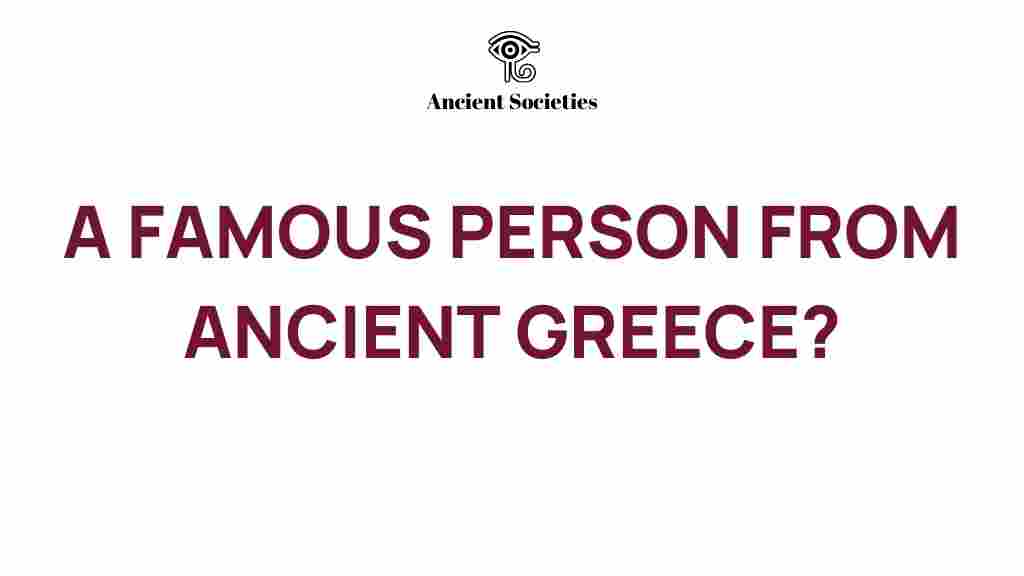Unveiling the Legacy of a Legendary Figure from Ancient Greece
Ancient Greece is a cornerstone of Western civilization, a period rich in history, culture, and mythology that has shaped our understanding of democracy, philosophy, and the human experience. This article delves into the legacy of one of its most famous figures, exploring how their contributions continue to influence modern society.
The Birth of Democracy
One cannot speak of Ancient Greece without acknowledging its pioneering role in the development of democracy. The city-state of Athens is often credited as the birthplace of this revolutionary system of governance. It was here that citizens could participate directly in political decision-making, a radical shift from the autocratic regimes that preceded it.
- Cleisthenes: Known as the “Father of Athenian Democracy,” he introduced reforms that allowed for greater public participation.
- Pericles: A prominent leader during Athens’ Golden Age, he expanded democracy and promoted arts and culture.
The legacy of these figures is evident today, as democratic principles continue to underpin political systems around the world.
Famous Philosophers of Ancient Greece
Philosophy flourished in Ancient Greece, with thinkers whose ideas have stood the test of time. Their contributions to ethics, metaphysics, and epistemology laid the groundwork for modern philosophical thought.
- Socrates: Known for his Socratic method, he emphasized the importance of questioning and dialogue.
- Plato: A student of Socrates, his works explored justice, beauty, and the ideal state.
- Aristotle: A student of Plato, he made significant contributions to numerous fields, including logic, biology, and ethics.
These philosophers not only shaped the intellectual landscape of their time but also left a profound legacy that continues to influence contemporary thought.
Warriors and Military Prowess
In addition to philosophy and democracy, Ancient Greece is renowned for its warriors and military strategies. The Greek city-states were often engaged in conflicts, both internally and externally, leading to advancements in military tactics.
- Leonidas I: The Spartan king celebrated for his leadership during the Battle of Thermopylae.
- Alexander the Great: A student of Aristotle, he created one of the largest empires in history through his unparalleled military strategies.
The stories of these warriors are woven into the fabric of Greek mythology, illustrating their bravery and the ideals of honor and sacrifice.
Mythology: The Cultural Backbone
Ancient Greece is also known for its rich mythology, which served as a means to explain natural phenomena and human behavior. The myths of gods and heroes reflect the values and beliefs of Greek society.
- Zeus: The king of the gods, representing authority and law.
- Athena: The goddess of wisdom and warfare, symbolizing intelligence and strategy.
- Hercules: A hero known for his strength and numerous adventures, embodying the Greek ideal of heroism.
These myths are not just stories; they are integral to understanding the culture of Ancient Greece and its influence on later civilizations.
The Cultural Legacy
The legacy of Ancient Greece extends beyond politics and philosophy; it encompasses art, architecture, and literature. The Greeks made significant advancements in these fields, many of which have influenced Western culture.
- Architecture: The Parthenon in Athens stands as a testament to Greek architectural prowess and aesthetic principles.
- Literature: Epic poems like “The Iliad” and “The Odyssey” by Homer continue to be studied for their themes and narrative techniques.
- Drama: The Greeks pioneered theatrical performances, giving rise to genres such as tragedy and comedy.
These cultural achievements are part of the legacy that has shaped our artistic expressions and cultural values.
Step-by-Step Process: Understanding the Legacy of Ancient Greece
To truly appreciate the legacy of Ancient Greece, one can follow a systematic approach:
- Study the Historical Context: Understand the timeline of Ancient Greece, including the key events and figures.
- Explore Philosophical Ideas: Read works by famous philosophers and consider their impact on modern thought.
- Analyze Military Strategies: Examine the tactics used in famous battles and their outcomes.
- Dive into Mythology: Familiarize yourself with Greek myths and their significance in cultural practices.
- Appreciate the Arts: Visit museums or read about Greek art and architecture to understand their aesthetic principles.
This structured approach will provide a comprehensive understanding of how the legacy of Ancient Greece permeates various aspects of modern life.
Troubleshooting Tips: Common Questions about Ancient Greece
As you explore the legacy of Ancient Greece, you may encounter some common questions. Here are some troubleshooting tips:
- What are the main contributions of Ancient Greece to modern society?
Ancient Greece contributed significantly to democracy, philosophy, art, and science.
- How did mythology influence Greek culture?
Mythology provided moral lessons, cultural identity, and explanations for natural phenomena.
- Which philosophers had the greatest impact?
Socrates, Plato, and Aristotle are often regarded as the most influential philosophers.
If you need further information, you can check out additional resources on Ancient Greek history.
Conclusion
The legacy of Ancient Greece is a tapestry woven with the threads of democracy, philosophy, mythology, and culture. The famous figures from this era—philosophers like Socrates and warriors like Alexander the Great—have left indelible marks on history that continue to resonate today. As we navigate our modern world, understanding this legacy allows us to appreciate the foundations of our own society and the enduring influence of Ancient Greece.
To delve deeper into the captivating world of Ancient Greece and its famous figures, explore various literature and academic resources. The richness of this ancient civilization offers endless opportunities for learning and discovery.
This article is in the category History and created by AncientSocieties Team
